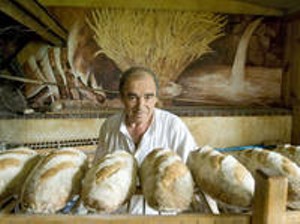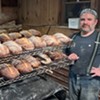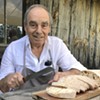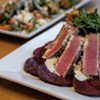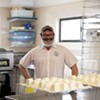Published June 6, 2007 at 10:10 p.m.
Gérard Rubaud pulls a soccer-ball-sized piece of dough from a huge mechanical mixer and plops it on a countertop, then drops an upside-down bucket on top. Next, he shuffles across the floor of his Westford bakery, his right leg dragging slightly with each step, until he's standing in front of a gigantic wood-fired oven. In French-accented English, the 66-year-old describes how he builds up a fire in the evening — then, in the pre-dawn hours, rakes the glowing embers into the pit below for morning baking. As he laboriously closes the hefty metal doors and moves away from the oven, Jo-Jo, a Lab puppy with a beard of flour on his muzzle, prances precariously underfoot.
While the mixer-to-oven routine is a familiar one for Rubaud — he's been baking professionally since he was 13 years old — the slow, deliberate pace is not. In March of 2004, Rubaud suffered a debilitating stroke. While he spent nine months in the hospital, his chewy, slightly sour bread quietly disappeared from the shelves of local grocery stores. Members of the Intervale Community Farm, who relied on it, stopped receiving the country-style staple.
In his heyday, Rubaud used to churn out 1200 to 1300 loaves of pain levain — bread leavened with wild yeasts — each week. These days, he is able to produce only about half that amount. But the fact that he can bake at all comes as a shock to his doctors, who didn't believe he ever would. "Yeah, 'the miracle patient,' they called me," Rubaud chuckles, then adds, "I think there are people more damaged than me doing as well. But I'm happy to have regained what I have regained."
After extensive rehabilitation, during which he learned to walk again, Rubaud returned to baking on a very small scale in 2005. He made bread twice a week, but had to hire someone else to load the loaves into the oven. "I had one hand moving forward and one moving backwards . . . I lost coordination completely," he recalls. "I had to relearn, like I had to relearn everything." Rubaud managed to make enough loaves to supply ICF members with their weekly fix. This past January he stepped up the pace: Now his bread is back on the shelves at both Healthy Living and City Market.
Because he doesn't like the taste of wheat bran, Rubaud's signature loaf combines white flour with a blend of rye and spelt that he mills himself. "The bran from spelt, that's delicious. It's very nutty," he says. "A good 15 percent of rye and spelt gives enough bite without creating a lot of acidity."
While some sourdough is tongue-tingling, Rubaud strives to make his more subtle and complex. "I am personally opposed to the real California sourdough, 'cause it is so powerful you can't feel anything else," he announces. "Bread is to be used to enhance the food, not overpower it." He achieves this complexity by using two different types of starters, a levain and a poolish: The first is fairly stiff, the second more liquid. With different levels of hydration, "you develop totally different acids," declares Rubaud. He blends the levain with the poolish when he gives the dough its final mix. The result is nearly impossible to duplicate.
Rubaud's youthful forays into baking weren't for the love of the dough. He was driven to the oven by a distaste for studies and a passion for the ski slopes. "No one wanted to keep me there," he says of school, "so I started an apprenticeship." He got into bread because "baking was night stuff . . . I did it because that was what would allow me to ski during the day."
Rubaud made the French national ski team, and, when his competitive career ended, in 1964, he took his racing expertise to ski maker Rossignol. Ten years later, the firm brought him to its then-North American headquarters in Williston. "I spent 22 years at Rossignol, and my dream was to be head of the U.S. operation and Canada," Rubaud discloses, "but after four years of being president, I said, 'I'd rather bake bread.'"
Why the sudden shift? The answer offers a glimpse into Rubaud's personality: "No more challenge," he recalls. "I was playing golf most of the time. You can only take so much golf."
At that time, Rubaud had a small brick oven near his family's Westford home, which he used to make loaves and flatbreads for family and friends. Still, when he returned to food, he didn't start with baking as a professional venture. Instead, he opened Gérard's Haute Cuisine, a restaurant and food manufacturing business specializing in the sous-vide cooking technique, which was then practically unknown in America.
Sous-vide, which literally means "under vacuum," refers to the process of suction-sealing food in heavy-duty plastic bags. Although some items are not processed further — the vacuum alone changes their character — most are cooked delicately in hot water baths. The point is to lock in juices and flavor. It's the gentler, gourmet version of "boil-in-a-bag."
These days, the sous-vide trend is on fire: Celeb chefs such as Thomas Keller, Charlie Trotter and Joël Robuchon vacuum-pack everything from foie gras to watermelon, and sell the results for exorbitant prices. But back in the 1980s, when Rubaud tried to introduce it, the United States wasn't ready for sous-vide, even as home cooks embraced Uncle Ben's instant rice and microwave dinners. "Basically, it was too early," says Rubaud. "It was nice to be the first one to do it; that's the glory, but you lose your shirt."
Rubaud made one last foray into the world of restaurants, a two-year stint at the Radisson Hotel eatery, then known as Gérard's at the Radisson. Finally, he decided it was time to make his dough by just making dough. As Rubaud puts it, "I'd rather do bread and live with the stones and the grass and the little birds." He added a 50-ton brick-and-clay oven to his bakery and began the life's work of perfecting his pain levain recipe.
While many artisanal bakers offer a selection of French breads, such as baguettes, boules and brioche, Rubaud limits himself to one variety. "I'd better do one as good as I can than to do three mediocre. By doing one, it's easier to find ways to improve on the bread," he posits. "When you get two different doughs or three different doughs . . . it's confusing — even for somebody without a stroke."
Rubaud's bakery features an abundance of pale, hand-hewn wood, murals and a mountain view. As he explains his craft, to the strains of classical music from his radio, Jo-Jo struggles to ascend the platform on which his master's chair rests. But he's too small to climb up and can't find the stairs on his own. Rubaud pulls himself to his feet so he can give the dog a gentle push in the right direction. He watches as Jo-Jo scrabbles helplessly at the step before gaining purchase and says, "You learn by doing. If you get kicked, you get kicked."
That philosophy — along with his single-minded desire to craft the perfect loaf — hints at how Rubaud achieved his surprising recuperation. "At first, I decided that the wheelchair, I had to get rid of it," he says. "I was able in just a few months to get out of it. You just have to believe that you will walk again, and you will recover, which I'm doing." The recovery hasn't come without setbacks. Rubaud has had two seizures since January, one just a couple of weeks ago. He shrugs them off, saying, "That is not uncommon."
As Rubaud tells it, his love for his work gave him the will power to push through the pain. "Baking definitely helped me get better . . . You have to be passionate about . . . a job, because there's nothing else to give you justification to fight," he says. "Bread was the ticket for me." Baking also served as a form of physical therapy. "Doing bread, like doing any mechanically repetitive thing, you can measure how well or poorly you're doing every day," he explains. "So you have a checkpoint and you know where you are."
Even though Rubaud can no longer drive and spends almost all his time sleeping or in the bakery, he says he has significant personal and professional satisfaction. "I'm the happiest I've ever been. I go slower, but I work better." Better? "I consider my bread today on an average better than before the stroke," Rubaud says. "I think by doing less, it helps . . . because you can't work well under stress, and [with less pressure] you keep the passion for what you're doing."
At local markets and the Intervale, fans of Rubaud's bread rejoice in the return of his unique loaves — many without knowing why they'd ever disappeared. And the baker? "The way I look at it, it's all a bonus," he says of surviving the stroke and regaining the ability to pursue his passion. "But," he continues impishly, "I'd like a bigger bonus."
For Gerard's Country Bread recipe, see the story online or on Suzanne Podhaizer's blog, Omnivore.
*************
Gérard's Westford Place
The obstinate heroism of him —
he'll bake till the end
in that gentle meadowy setting
with stone walls set into various hillsides
accenting the vista with handmade
defining geometry of rock
flat and round set into patterns
sprouting occasional ferns
a maple crowning the center,
puffy high clouds moving with authority
over hills, on and on into the distance.
And the baker, observing it all
after another night of loud classics
accompanying his baking
his weighing the flour
mixing with spelt, poulish, water
whatever few precise ingredients are needed
the pulling the kneading the shaping
setting long loaves and round loaves
on fabric slings for hours of rising
at just the right temperature, moisture
and finally the baking in the
huge beautiful handmade brick oven.
a space surrounded by golden wood tables
benches shelves cabinets — all handmade smooth
matte finished from years of baking
spacious efficient functional beautiful
a carved flower on a cabinet door
At the sun-shaded picnic table
we drank wine and ate bread
herbed olive oil for dipping
textured crusty perfect
and a fine simple meal pulled from the
same brick oven by his daughter
his granddaughter set the table
forks and knives plunked right down
his young artist girlfriend there too
Gérard with his knowing French ways
quietly prevails
denying the challenge of illness
loving the vistas, the baking
the guests and the girl
indomitable, wedded to beauty
striving for perfect loaves
— Buff Lindau, 2005
********************
Green Gene
Gérard isn't the only Rubaud spicing up the local food scene. His daughter, Julie Rubaud, 37, runs Red Wagon Plants in Hinesburg. There, in four sizeable greenhouses, she and her staff grow over 320 organic varieties of herb, vegetable and flower seedlings for gardeners and culinary enthusiasts. They also do a wholesale business, supplying local garden centers and food co-ops.
Growing your own seedlings may seem easy enough — open packet, put seeds in dirt, water and wait. But according to Rubaud, it's not that simple: "It's really hard to start good seedlings on a window sill. Then you put out leggy, yellow seedlings." She explains that hearty, high-yield plants require a couple of specialized conditions: abundant overhead light, so plants grow straight and don't become spindly; and lots of air circulation, to foster stocky stems and tough, insect-resistant "skin."
"Buying healthy seedlings is a form of season extension," says Rubaud.
Although she helped her father garden as a youngster, it took Rubaud a lot longer to get interested in farming. "I don't think I was into it as a kid at all," she says. "I don't want to romanticize that. It was all forced labor." Still, she sounds proud as she reminisces about her "very French" upbringing: "When we moved to Westford, my dad built a greenhouse with raised beds in it, and we had lettuce, we had sheep and capons and chickens for eggs . . . we had currants." Though Rubaud may have grumbled over her chores, she learned that "the kitchen shapes the garden; the garden shapes what's happening in the kitchen," she says.
Rubaud attended boarding school, working at her father's restaurants during breaks, then matriculated at UVM where her mother taught French. She earned a B.A. in English and philosophy, with a concentration in "17th-century radical literature of the Revolution," and was accepted to a philosophy graduate program in Montréal. That was when Rubaud decided to return to her roots and become a farmer.
The catalysts? A part-time job at Digger's Mirth in the Intervale and a cross-country road trip that took her to the lush organic gardens at U.C. Santa Cruz. Standing in a patch of tall red chard, with the ocean as a backdrop, Rubaud realized she "was in love" with agriculture and "couldn't imagine doing anything else."
Rubaud stayed with Digger's Mirth until 1999. That year, she and her former partner, Eric Rozendaal, went into business together as Eric & Julie's. Rubaud grew and sold seedlings while Rozendaal grew veggies. In 2005, after the couple split, Rubaud founded Red Wagon. Rozendaal's current Starksboro operation is Rockville Market Farm.
Although many of the plant varieties she sells are considered "heirloom," Rubaud isn't hung up on the buzzword that denotes rediscovered, old-fashioned varieties. "It's hard to say what's an heirloom. It's not like that's a botanical term," she explains. Rubaud prefers to grow varieties she refers to as "vegetables with stories," such as "silver queen" thyme, coral-colored "garden peach" tomatoes and extra-sweet, French "Charentais" melons.
Rubaud's business thrives on helping people grow sublimely tasty food. "It's so much easier to cook if you have these fresh things; you can take so little time in the kitchen. You just need olive oil, lemon juice and some salt," she enthuses. "Fresh herbs make all the difference. Anyone who likes to cook should have a few pots of herbs outside their door or on a windowsill."
Info:
More By This Author
Speaking of Food, Healthy Living Market & Café
-

Q&A: Howard Fisher Delivers Meals on Wheels With a Side of Good Cheer
Dec 20, 2023 -

Video: Howard Fisher Delivers Meals on Wheels
Dec 14, 2023 -

Q&A: Alexis Dexter Rescued 57 Shelter Cats During the July Flood
Sep 13, 2023 -

Video: Two Months After the Flood, Alexis Dexter Rebuilds Kitty Korner Café in Barre and Continues to Rescue Cats
Sep 7, 2023 -

Best locally owned grocery store
Aug 2, 2023 - More »
Comments
Comments are closed.
From 2014-2020, Seven Days allowed readers to comment on all stories posted on our website. While we've appreciated the suggestions and insights, right now Seven Days is prioritizing our core mission — producing high-quality, responsible local journalism — over moderating online debates between readers.
To criticize, correct or praise our reporting, please send us a letter to the editor or send us a tip. We’ll check it out and report the results.
Online comments may return when we have better tech tools for managing them. Thanks for reading.



































